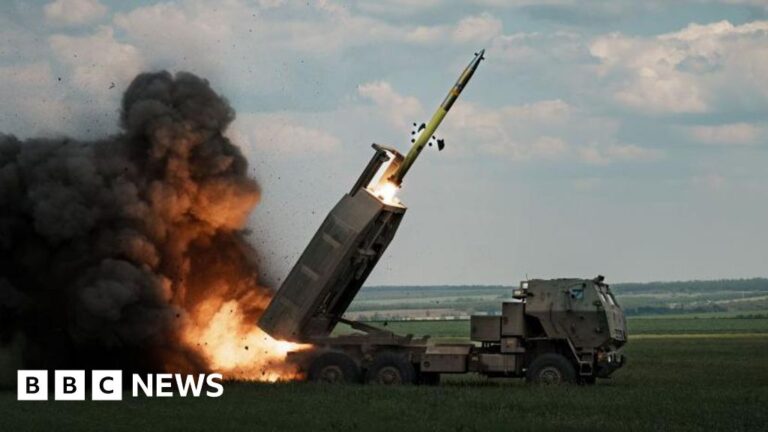- author, Laura Gozzi
- role, BBC News
-
Pressure is growing on US President Joe Biden to allow Ukraine to attack Russian territory using weapons supplied by Western countries.
Several countries this week signalled they were open to that possibility after months of fears of escalating tensions.
Russian President Vladimir Putin warned of “serious consequences”, especially for what he called Europe’s “smaller countries”.
On Wednesday, US Secretary of State Antony Blinken, who is currently in the Czech capital Prague for a meeting of NATO foreign ministers, said the US position on the issue would “adapt and adjust” as conditions on the battlefield change.
White House national security spokesman John Kirby said late Wednesday that while U.S. support for Kiev was shifting, “there is no change in our policy at this time.”
Ukraine has been struggling to counter a Russian offensive in the east, while the city of Kharkiv has been hit for weeks by deadly, and often Russian, attacks from military positions near the Ukrainian border.
Blinken’s comments, during a European tour, came after French President Emmanuel Macron said earlier this week that Ukraine “should be allowed” to use Western-supplied weapons against military installations on Russian territory, but technically not to target civilians.
Image source, Getty Images
Macron has long called for more direct intervention in the Ukraine war, an idea that other Western leaders appear to be softening to.
German Chancellor Olaf Scholz has remained cautious in public, but a spokesman in Berlin said “defensive action will not be limited to our own territory, but will also include the territory of the aggressor.”
Last week, NATO Secretary General Jens Stoltenberg told The Economist that Western countries should allow Ukraine to attack Russian military bases to defend itself. “Ukraine has the right to defend itself, and that includes attacking targets on Russian territory,” he said.
British Foreign Secretary David Cameron said earlier this month that it was up to Ukraine to decide how to use British weapons, while Poland’s deputy defence minister said this week that Ukraine could use Polish weapons “as it sees fit”.
Ukrainian President Volodymyr Zelensky has previously said it was “unfair” for Western countries to impose restrictions on the use of weapons, while acknowledging that Ukraine cannot risk losing the support of its partners.
Russia has reacted angrily to the possibility of Western weapons being used against targets on its territory.
“Europe, and especially the small countries, should know what they are dealing with,” President Vladimir Putin said, noting that many European countries are “territorially small” and densely populated.
The Russian leader added that Western arms suppliers would be held responsible for any attack on Russian territory, even if it was carried out by Ukrainian forces.
Some NATO countries remain concerned about the prospect. Italian Prime Minister Giorgia Meloni said on Thursday he saw no need to attack Russian military bases and instead called on Western countries to increase the supply of air defense forces to Ukraine.
However, Ukraine is believed to have already used weapons supplied by Western countries to attack Russian territory, although without any major publicity.
Latvian Foreign Minister Baiba Bladze told Ukrainian media that some countries have already provided weapons to Ukraine “unconditionally” but that not “all” have been made public.
Other countries have been willing to give Ukraine permission to use weapons in Russia.
The United States has already supplied Ukraine with thousands of defensive weapons, tanks and air defense systems.
Since April, Russia has also deployed a longer-range version of its ATACMS missiles, with a maximum range of 190 miles (300 kilometers), to Ukraine.
In the past, Ukraine has used drones to attack targets further inside Russian territory.
Earlier this week, a Ukrainian drone was reported to have successfully attacked an early warning radar near the city of Orsk, about 1,500 kilometers (932 miles) from the Ukrainian border.

